Virgili Paez1, Silvia Sastre-Suarez1, Catalina Piza1, Monica Font1, Elena Pastor-Ramon1 and Maria Costa-Marin1
1Virtual Health Sciences Library of the Balearic Islands, Palma de Mallorca, Spain
Corresponding author: Virgili Paez, vpaez@bibliosalut.com
Abstract
Introduction: Infosalut (http://www.infosalut.com) is a new service from the Virtual Health Sciences Library of the Balearic Islands (Bibliosalut). Its aim is to spread amongst the professionals of the public health system of the Balearic Islands the information generated by the system itself, and to give visibility to the work of the organization.
Methods:
Infosalut started with the creation of a website to promote and give visibility to the information generated by the Public Health System of the Balearic Islands. This is divided into two major sections: news and training agenda, and also has a section that collects all the daily information about the official worldwide health days. This new website was created with Joomla content management system, with a multilingual (Spanish and Catalan) and journalistic template with a mobile version that responds to the needs of the content presentation. From there, the library team produced manuals and procedures on how to collect and manage the susceptible information to appear in Infosalut. At the same time, the Bibliosalut team designed a system to disseminate the Infosalut contents. The result was the creation of Infosalut profiles in the most important social networks and a subscription newsletter.
Results:
The result is a web portal that manages the institution information, through a news section, classified into thematic categories, which are subdivided into: training, research and innovation, health management, public health, pharmacy and scholarship grants and awards. There is also, a training agenda, where we have included all the interesting activities for the public health system professionals in the Balearic Islands. However, the best result is the integration of the virtual library into the institution through a direct collaboration with users and those responsible for the different institution services, who publish their news on Infosalut.
Conclusions:
Infosalut is a broadcasting and communication channel, which uses the best technology and design available, and is extremely useful for all the workers in the Public Health System of the Balearic Islands. The work done by Bibliosalut librarians in creating and maintaining this new service demonstrates their great ability to innovate and respond to the information needs of the institution they serve, as well as the easy integration and the collaboration work with the users. In conclusion, this experience readily shows how the librarian can add value to the institution information management.
Key words: Libraries, Digital; Knowledge Management; Health Services Administration; Public Health Informatics; Periodicals as Topic; News [Publication Type].
Introduction
Traditionally, the main role of libraries that depend on an institution has been managing information that users need to work (bibliographic databases, journals, catalogues, etc.), but today organisations have realized the importance of managing their own knowledge. In libraries, this has generated new tasks and services related to knowledge management, such as websites and intranets, social networks, institutional repositories and web content management.
The mission of the Virtual Library of Health Sciences of the Balearic Islands (Bibliosalut) is to facilitate the most important scientific information to the public health professionals of the Balearic Islands by using the new information and communication technologies in order to contribute to the improvement of quality in medical care, teaching, research and health management (1-2).
Therefore, the Bibliosalut team realized that there was a lot of information generated by the Public Health System of the Balearic Islands (intranet, websites, etc.), and other information that usually would not be published. This is why in 2011 librarians from Bibliosalut began to work on a new service to respond to this reality and to give visibility to the work of the organization. This new service was called Infosalut (3).
Methods
The creation of Infosalut took four years. Bibliosalut began analysing the content that they wanted to publish; basically news and events generated by the local health system itself, which forms this product.
News about training, research and innovation, health management, public health, pharmacy and scholarships grants and awards were detected, so that was the reason to structure and classify them into thematic categories and subcategories.
The proposal of the following goal is to share information generated by the public health system of the Balearic Islands amongst the professionals and give visibility to the organization activities. In general terms, this new service seeks to enhance the dissemination and visibility of the activities of the institution, and sharing this information both inside and outside the organization.
To achieve this objective an easy tool to upgrade and be used by readers was needed; so they decided to create the portal http://www.infosalut.com. Next step was to design this new service about knowledge management, and for this, the new website was divided into two main sections: one dedicated to the news generated by the institution and another training agenda that may be interesting to health professionals. Besides, a section was created that collects the information about the official international and national of health days.
Later, we focused on the technical part of the project and selected the content management system (CMS) Joomla to create the web (Fig. I). This CMS met Bibliosalut requirements because it allowed the use of a multilingual interface that would respond to the need for a portal in two languages (Spanish and Catalan), to display information in a journalistic format and with the added benefit of having a mobile version.
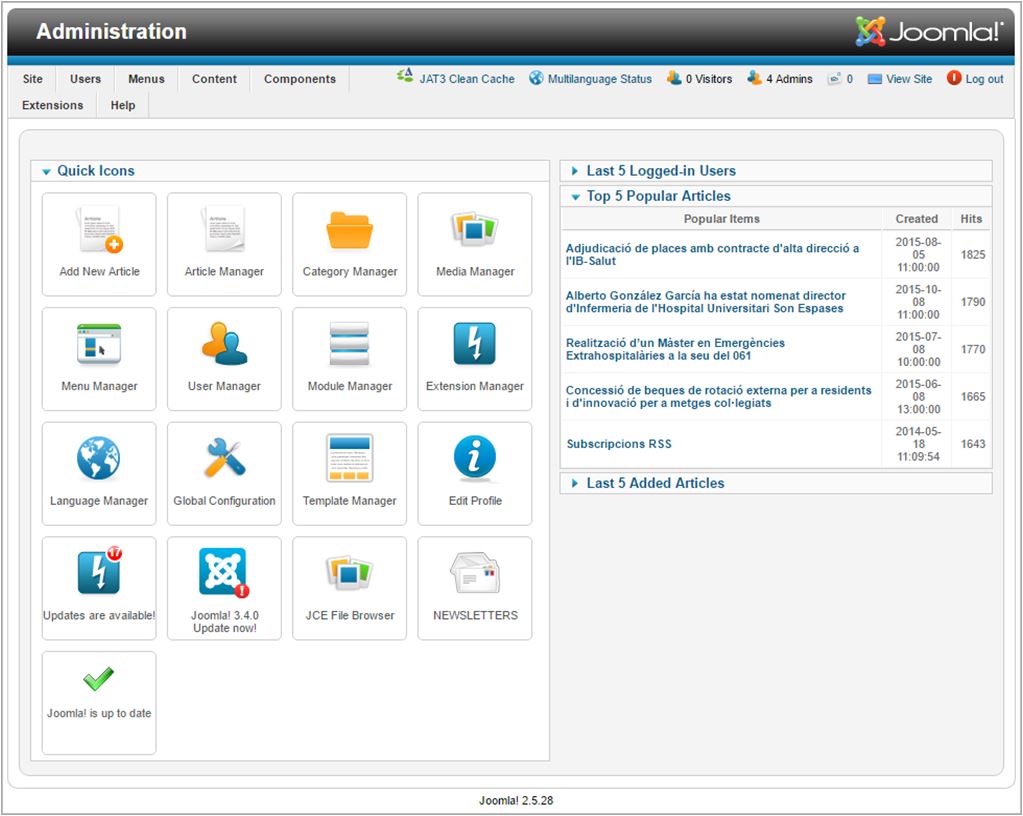
Figure I. CMS Joomla admin interface
Manuals and procedures were written to establish how to collect and manage the information likely to appear in Infosalut. This step was very important because it is a service where many people work, so it was essential to coordinate and develop a clear definition of tasks.
Finally, a social media plan was made to disseminate the contents added to Infosalut. This began with the creation of the Infosalut profile on major social networks (Facebook, Twitter, YouTube and Google+) and a newsletter, which the users can subscribe to. At this stage, Bibliosalut wanted to pay attention to detail by designing and creating its own identification logo with a clean and modern design.
The management of the images was analysed and it was agreed that the best solution was to create an image bank using the RSMedia Gallery (Fig. II), a Joomla extension. This bench is formed by self-created images, others with a Creative Commons open license, and images shared among the different institutions of the Public Health System of the Balearic Islands.
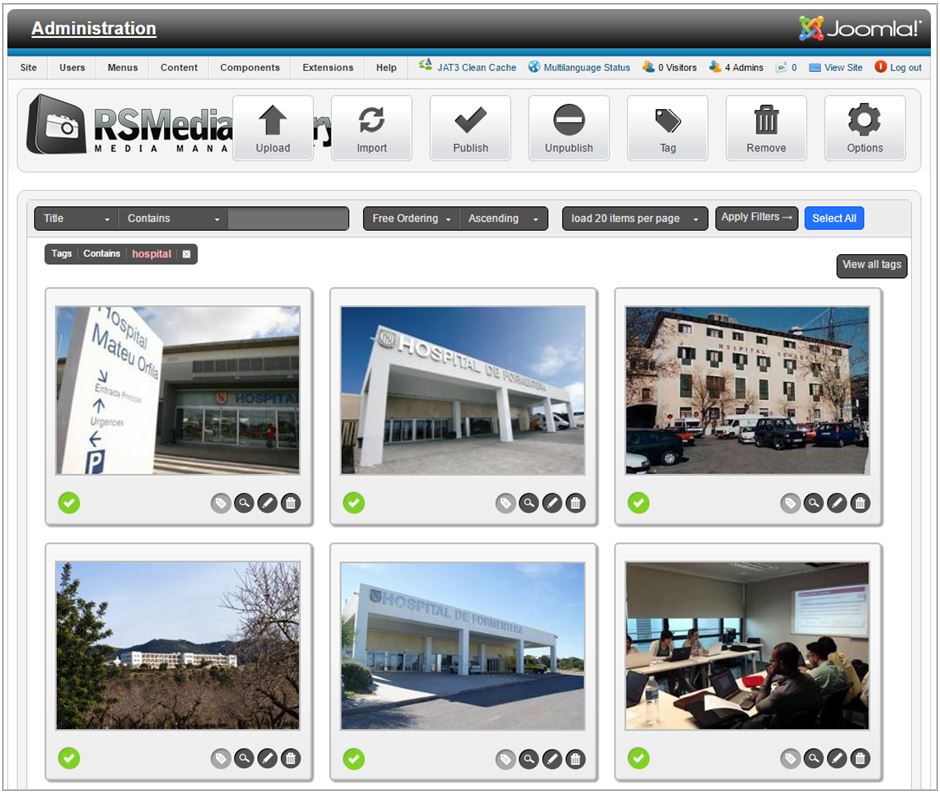
Figure II. RSSMedia Gallery interface

Fig. III. Infosalut.com |
Results
After four years working on its development, the Infosalut website was premiered in April 2015 (Fig. III). Infosalut news is collected from different sources, which can be divided into internal and external. Internal includes for instance, websites, intranets and social networks from health system institutions. It is important to note that not all the news is written by the Bibliosalut team, and increasingly, some of the news is being contributed by users, as some of the health professionals want to inform others of their work. On the other hand, Bibliosalut collects news from external sources too, which are subsequently published in Infosalut, such as bibliographic databases, official bulletins, and communications from other related institutions. The text is written in Catalan, after that it is translated into Spanish, due to the CMS allowing a multilingual interface, and then an illustrative image is added. Secondly, a linguistic review is made. The last step is to schedule and publish the news, so this system allows one to feature and leave the news ready to be posted just after being written, with no need to publish at a specific time. The agenda (Fig. IV) is the other section of Infosalut, where interesting activities for the health professionals are included. We refer to courses, postgraduate courses, congresses, conferences, sessions, workshops, etc. As with the news, the training activities are disseminated through social networks once they have been published in the Agenda on different days and hours. Infosalut includes a section that collects information about national and international health days. It is linked to the websites of associations and organizations that promote the initiative to create this day to give visibility to these events. Videos published by the institution are shared in YouTube Infosalut channel. There are always two highlighted videos on the home page of Infosalut. |
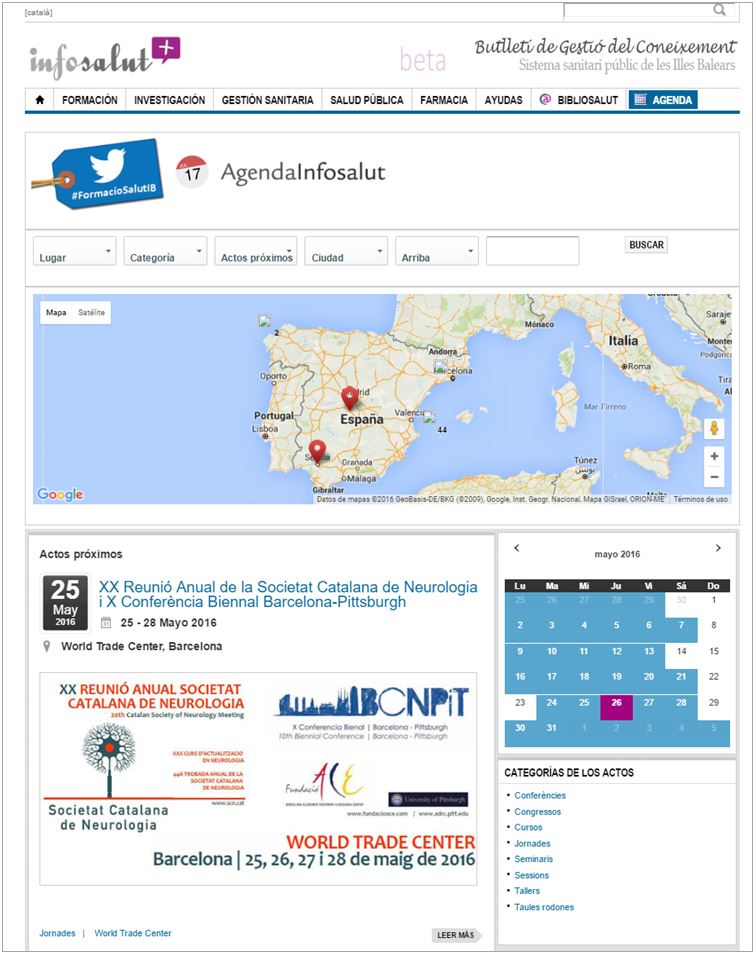
Fig. IV. Agenda interface of Infosalut
All the news published is then disseminated through social networks: Facebook, Twitter and Google+. Bibliosalut’s community manager performs this work by using Hootsuite, an online tool to manage social networks, which allows schedule posts to be published at different hours and days (Fig. V). With that, Bibliosalut wants to increase the visibility of the news published in Infosalut. Two hashtags were created to collect agenda information (#FormacioSalutIB) and research dissemination on health in the Balearic Islands (#PublicaSalutIB).
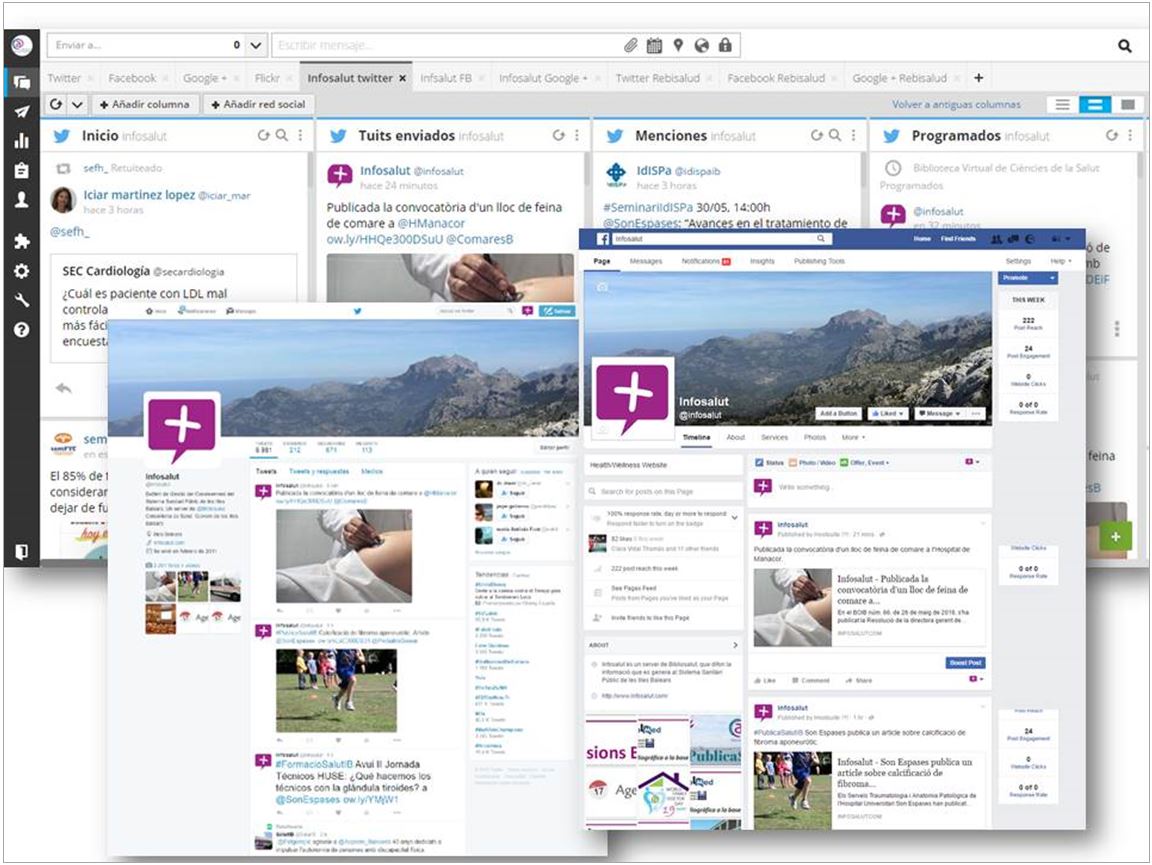
Fig. V. Hootsuite and social networks of Infosalut
Most of the members of Bibliosalut are involved in the development of the Infosalut project and carry out different tasks: content curation, website administration, community management on social networks, linguistic consultancy, image edition, press revision, and the like.
There are tasks directly related to information management, but very different from the traditional view of librarians. It is important to emphasize, that thanks to Infosalut, the organization has become more aware of the work of Bibliosalut. An example of that is #PublicaSalutIB, a service that aims to give visibility to the research work of all our potential users by means of social networks and Infosalut. Before creating Infosalut, this service consisted in publishing a post through Bibliosalut social networks reporting the publication of new scientific work with the hashtag #PublicaSalutIB. Currently, this service has been completed with the publication of news in Infosalut, which is in the subcategory Studies and Projects (Fig. VI). The scientific work is briefly explained and gives more visibility to the authors and their institutions. Moreover, a quoted reference in Vancouver style, a bibliometric alternative indicator (Altmetric), PubMed link and an access to the full text by the link resolver of Bibliosalut are shown.
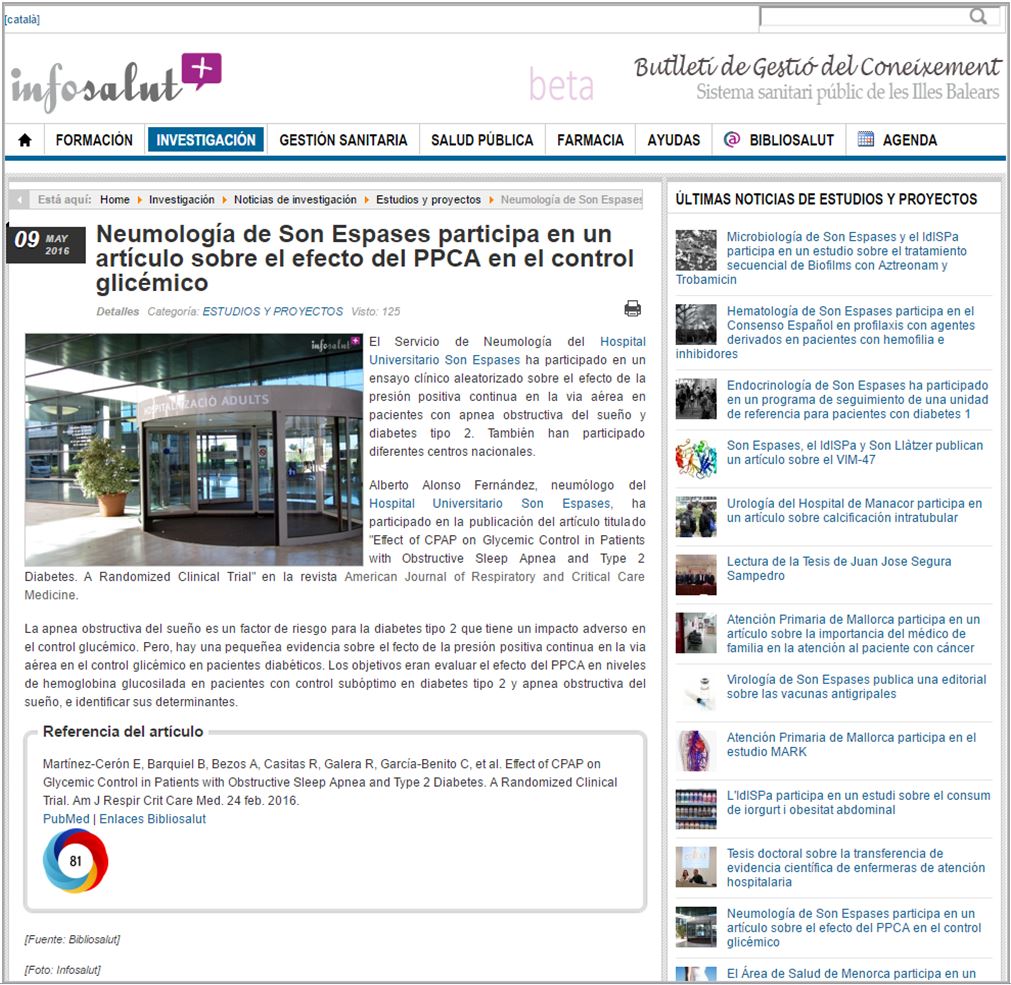
Fig. VI. Studies and Projects subcategory with an example of #PublicaSalutIB
Infosalut is consulted and disseminated through different channels: website, with desktop and mobile versions, RSS, and social networks. Nowadays, they are working on developing other ways to spread the information by Telegram, newsletters, and Botize.com.
Conclusions
The roles of librarians in health sciences are changing. We need knowledge, but also the following general and personal skills are basic needs in a virtual environment: the capacity to adapt to new times, always innovating, the capacity to work with multidisciplinary teams, leadership qualities and project management skills, training and public communication skills (4).
Bibliosalut believes that Infosalut is an example of how the intervention of librarians in knowledge management and the execution of an information and communication project can contribute to improving the function of the organization. Every day, there are new ideas and proposals for the upgrading of this new service with great possibilities for Bibliosalut and the institution to which it depends.
Infosalut is a broadcasting and communication channel, useful for the professionals of the Public Health System of the Balearic Islands, with a modern technology and visual design. The work done by the Bibliosalut librarians in the creation and maintenance of this new service demonstrates their ability to innovate, adapt and respond to the information needs of the institution they serve, as well as the easy integration and collaborative work with their users.
REFERENCES
- Páez Cervi V, Pastor-Ramon E, Sastre-Suárez S, Peláez Jiménez M, Costa Marín M. Bibliosalut: La Biblioteca Virtual de Ciencias de la Salud de las Islas Baleares [Internet]. Bol ANABAD. 2013 [Cited 2016 Apr 8];63(2):55-71. Available from:
http://www.anabad.org/publicaciones/boletin/1827-2013-num-2-abril-junio-boletin-de-anabad.html - Páez Cervi V, Pastor Ramon E, Sastre Suárez S, Ordóñez Nievas R, Costa Marín M. The Virtual Health Sciences Library of the Balearic Islands: A regional project for libraries cooperation [Internet]. Poster presented at: 12th EAHIL Conference; 2010 Jun 14-18; Lisbon-Estoril, Portugal. [Cited 2016 Apr 8]. Available from: http://eprints.rclis.org/18671/
- Páez V, Costa-Marín M. El proyecto Infosalut. Gestionando la difusión de las noticias de la organización desde la biblioteca virtual. [Internet]. Poster presented at: XV Jornadas Nacionales de Información y Documentación en Ciencias de la Salud; 2014 May 22-23; Madrid, Spain. [Cited 2016 Apr 4]. Available from:
http://jornadasbibliosalud.isciii.es/wp-content/uploads/2014/05/Posterbibliosalud201421.jpg - Páez V, Sastre-Suárez S, Pastor-Ramon E, Costa-Marín M. Technological evolution in health libraries, and the implications for librarians: The experience of the Virtual Health Sciences Library of the Balearic Islands (Bibliosalut). [Internet]. Conference presented at: 14th EAHIL Conference; 2014 Jun 11-13; Rome, Italy. [Cited 2016 Abr 2]. Available from: http://eprints.rclis.org/23282/

